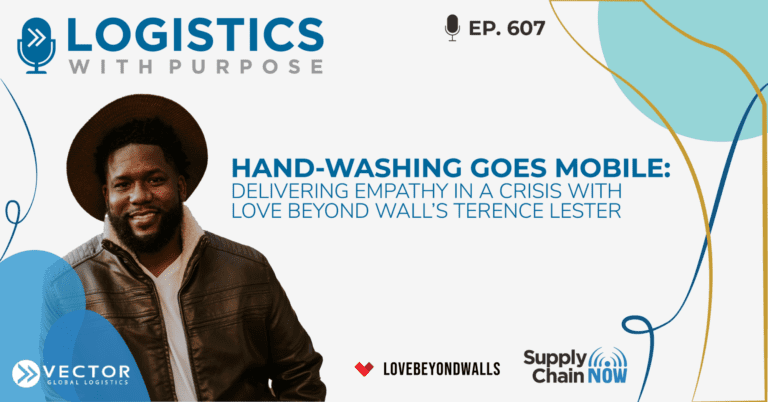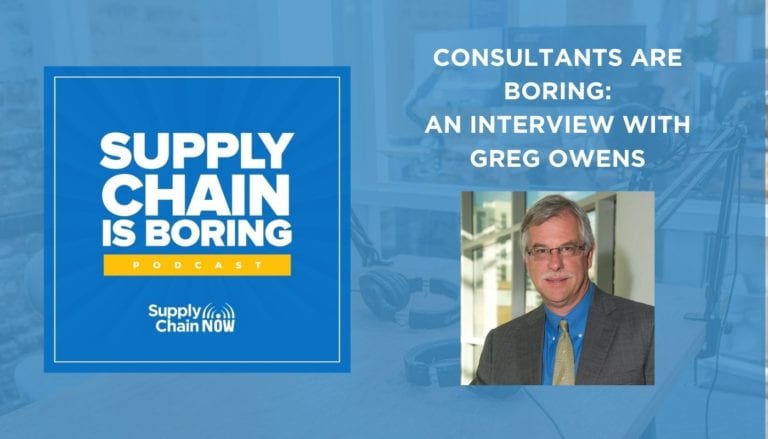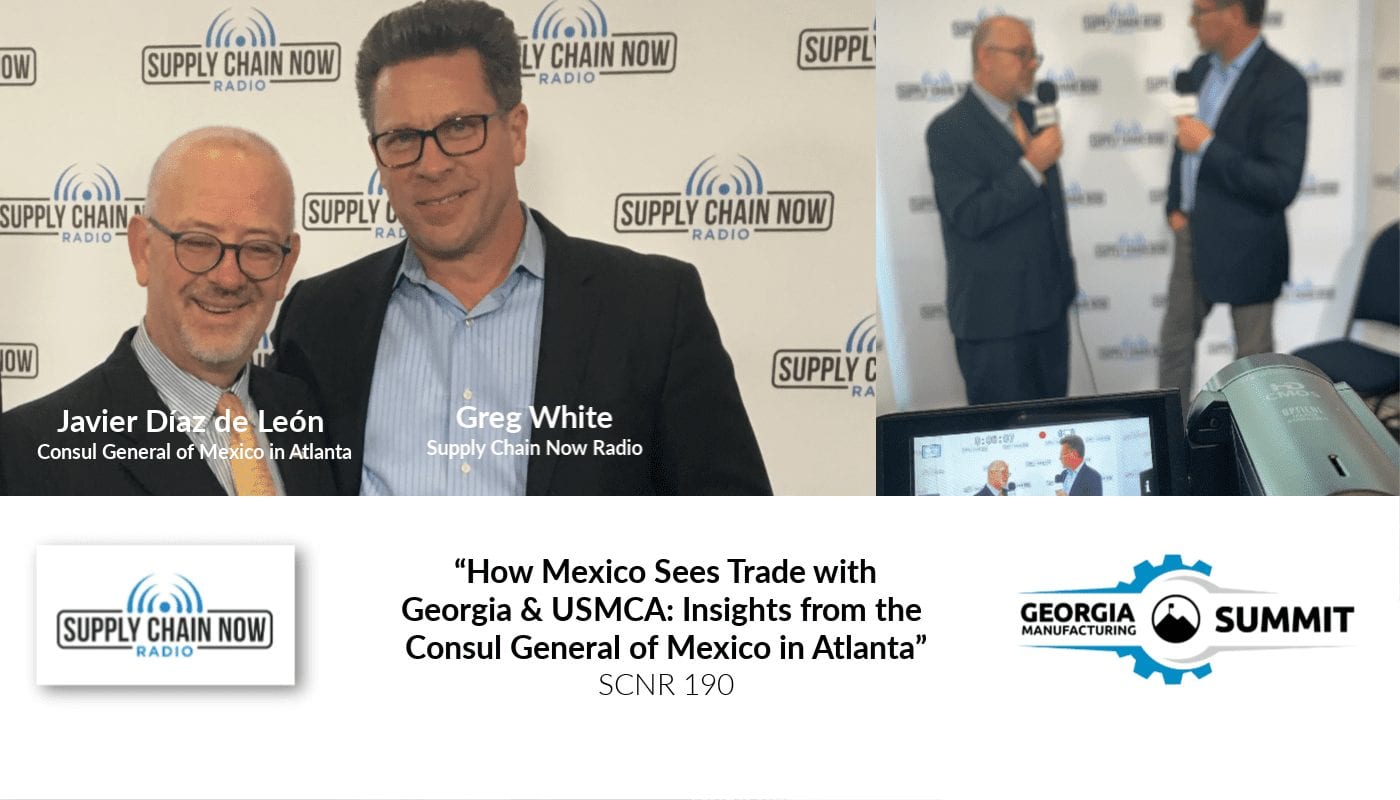[00:02:36] It’s a good. OK. Hey, this is Greg White with Supply Chain Now Radio, we’re here at the Georgia Manufacturing Summit and I’m here with Consul General of Mexico to Atlanta.
[00:02:58] Harvey aired The Australian. I said the whole thing. Well, it’s about that. Thank you. Well, welcome and thank you for coming. Little interested in maybe some pre thoughts on on the session here and anything jump out at you from the discussions you’ve had so far today? I know you’ve got a session, a panel session later today.
[00:03:20] We’re going to be part of a panel to talk about a little bit of the importance of the global markets and the supply chain international global supply chains for manufacturing. And it’s that’s right up our alley because I mean, Mexico is one of the strongest partners. So the United States and Mexico also, of course, is one of the strongest partners of Georgia. We are the number two buyer of Georgia products in the world. There’s only one country in the world that buys more Georgia products than Mexico. And guess what? This is Canada. So so the I mean, Georgia is very much a complete and, you know, embedded part of the North American manufacturing region that we have built for over 20 years. Right. We need to have greater awareness of that Greene, whereas awareness of that in here in Georgia, but also, you know, Mexico and Canada, because we are really important to each other.
[00:04:05] That’s great. So so your job is to work with us, of course, this particular state. Right. And and your consulate is here in Atlanta. So give us a brief history of how you got here. Can you tell us a little bit about your professional journey?
[00:04:22] Oh, thank you. I mean, I’m a career diplomat, so I mean, I’ve been a diplomat, Mexican diplomat for about 26 years. OK. My career has been probably not typical in the sense that I’ve had several posters in the United States. I only have way back at the beginning of my career a posting in Australia. OK. So my first posting was at a Mexican embassy in Australia, in Canberra. But after that, all my career has been taking place in the United States. That must be nice. It’s closer to has been great for my family. Yes, of course. But of course, I mean, this very great differences from one place to another. So we started out in San Diego many years ago. Then we moved to New York, then Washington, D.C. Then we were for a while in Raleigh, North Carolina. Now we’re hearing Atlanta. So we had a chance to live in very different cultures within the United States.
[00:05:13] Yeah. And it and a direct flight home probably doesn’t hurt.
[00:05:16] That is very convenient about Atlanta. We can be in Mexico City in about taking all for a little bit over four hours here. Right there. Direct flight, very comfortable. And we get a lot of family coming here to visit.
[00:05:29] Great, great. Especially this time of year, I hope. Let them see the seasons change here in Atlanta.
[00:05:35] Oh, this is my favorite time of the year. It is beautiful as I am. I’ve always loved Fall and Autumn and particularly here in Atlanta and of course, in particularly northern Georgia. So gorgeous.
[00:05:47] And it’s turning right now as we speak. Folks, I love it. Yeah. So tell us a little bit about. So you said that Mexico is the second largest trade partner of of Georgia. Tell us a little bit about what some of those products are.
[00:06:03] Well, that’s very that’s also does it. Thank you for doing making that question. But that’s very important when we talk about that. You know, the billions of dollars that we trade with each other between Georgia and Mexico, which is over 18 billion dollars. Wow. Every year that. And every year we reach a new summit in terms of the highest ever Daryl bilateral trade between Georgia and Mexico. And lot know people think that this is about finished goods, but that this is, you know, Georgia exporting, I don’t know, peanuts and peaches. That’s the first thing that comes to mind. I don’t know. Yeah. And and Mexico exporting tequila and avocados. OK.
[00:06:37] And of course, we do a lot of thinking, OK. I hope so. Yeah, of course. Yeah. We buy a lot of peaches on a lot of peanuts.
[00:06:45] But that’s not really what it’s about. OK. But we are really about this exporting and buying from each other. Manufacturing parts, electronics, cables, computer parts. OK. And of course, supply chains. I got I see the name of your radio station. That’s right. So it is UPS Supply chain that he’s built up built up in North America. Big company. Some plants that operate in Mexico and plants that operate here in Georgia. Plants in Georgia do not compete with plants in Mexico. They are complementary to each other.
[00:07:14] Yeah, well, we had a little bit of an example of that with Keith today, right. They have a plant here in West Point and also a plant in Mexico as well.
[00:07:21] Exactly. That is a perfect example of that, because the plant, the Keith planting in in West Point, Georgia, gets a lot of supplies and money. Chinnery on parts from the monk from the Keith plant in Monterrey, Mexico. OK. They are not like we’re competing with Georgia to try to. No. Right. These cars that are built and manufacturing the key up down here in Georgia. Ah Samake also cars built in Mexico because they they are, you know, part of the same supply chain.
[00:07:49] Right. And and I think they make it a different vehicle actually in the plant in Mexico or different set of vehicles that plants in Mexico. Right.
[00:07:56] That’s just part of the strategic, you know, abuse and plans of each manufacturer. I’m sorry. Like dad. I could give you like several all their stories of all their manufactories. Like, of course, you know, like, of course, a Ford company. That’s right. Sort of thinking in Mexico, under-votes wagon makes car and several other plants that have plants operating in the United States very successfully. Right. But they complement with plants operating in Mexico.
[00:08:22] That’s fantastic. I really think it’s I think it’s difficult for people to think of it in a broader spectrum than peanuts and tequila. And. But I think it’s important for people to know that there is a much, much deeper connection.
[00:08:35] I’m afraid I’m taking care of that relationship and taking care to make sure that those supply chains keep on, you know, being able to work and took out their easy access. I think what we do in our countries is crucial Kisha, because, for example, a few months ago I was at the Toyota Plantin in Huntsville, Alabama, on their Toyota plant. But it does is that it sense that the engines from the cars that they build there, they send them to pick one up for that to the Toyota plant in Tijuana, Mexico. Okay. And for them, the axis of those of those engines into the Mexico is critical. Yeah. And those sort of things are critical, again, for Georgia and the key plants, for example, to go and access, you know, parts and manufacturing elements that they need to come from the plant in Mexico, in Monterrey.
[00:09:25] Great. That’s great. So how do you think U.S., N.S.A. and its goals play into that? And then if you care to not to put you on the spot, but if you care to give us an idea of whatever your or Mexico’s general thoughts on USMC A.
[00:09:43] I mean, of course, Mexico is fully behind our daddio for updating our trade agreement with now after we see USMC us, an updating of NAFTA, putting it know on the 21st levels Liegghio, we need NAFTA at the early 90s. So it’s all over 25 years old, right. And we were we were the first free trade agreement between a developing country. How did you been upcountry ever? It’s hard to think about that now. But I mean, we really were trailblazers when we did NAFTA. Right. But it’s 25 over 25 years old. There was no such thing as, you know, digital trade back then. Right. And, you know, the energy sector and the medical medicos, all of that. Right. So we needed a new 21st century agreement. We thought we had that because we had done TPP. Right. But then the United States withdrew from TPP and then Canada and Mexico needed to sit down again with the United States and said, OK. So there’s no TPP. We need to upgrade our agreement. Yeah. So that’s what what, USMC? Yes.
[00:10:46] And that is what really keeps that free flow of goods going from border to border, not just Mexico and the U.S., but also Canada and the U.S. and Canada and Mexico. Yeah. And.
[00:10:57] I mean, we are absolutely convinced that North America as a manufacturing region, we are the most efficient and competitive region in the world. We don’t think of each other as that way. Right. That same thing happens in Mexico. And I can talk about. But Canadian France. But I think I’ve heard my Canadian colleague, a good friend, say the same thing. Yeah. Because we don’t think in terms of the labor Lussick North American region, but we are in terms of manufacturing. We are right. And if you consider what’s going on nowadays, you know, regarding trade with with it with Asia and other parts of the world, we’re not only the most competitive manufacturing region, we will be more important to each other in the future as we are now.
[00:11:39] Yeah, yeah. I completely agree. And I think it’s a really important it’s really important for us to come to some level of agreement. Not that I’m any kind of expert, but we need to have some level of surety between the company, the countries and, you know, Greg and I and I think the keyword is, you know, reliability.
[00:11:57] Yeah. To be to be aware, I have certainty of where we’re going. And I think, of course, for you know, for the investors and people who are thinking about putting money into projects for manufacturing, the keyword is certainty. Yes. And for us, certainty means having a treaty like this where, you know, the industry will know what are going to be there, that the rules in play for the first next few years so they can have certainty for their investments.
[00:12:24] Yeah. And it it accrues to the benefit of everyone in North America to do that, to be, you know, to be able to have that certainty is is critical for all of the countries. And I think I think we have to recognize that we’re all partners in this regardless of whatever the level is of N in port. And exports of any of the individual countries, we’re all important to one another.
[00:12:48] And we’ll be understanding sometime this a little bit of anxiety regarding deficits. I know we understand. But if you look at the numbers, the U.S. numbers regarding where the deficits are, the real problems are not in North America. Yeah, the problems are elsewhere. And the other thing is that you really need to look into what. What sort of products are you trading with? Like I was saying before. What we are trading with each other are, you know, parts for manufacturing. Which makes us stronger and more, more effective. That is not what’s going on in other parts of the world, which, you know, that deficits are created by other sorts of products that are not connected to supply chain. Some manufacturing. Right.
[00:13:25] Right. Well, thank you. I know you’ve got a panel session that you’re going to do. So what’s the topic of your panel session?
[00:13:32] Well, it’s probably talking a lot about it. What I just said to you. So it’s it’s OK. So we got you warmed up for that. It was an excellent warm up session for me.
[00:13:41] Ok. That’s great. Well, I appreciate it. I appreciate your time. Haveyour, D-S.D. Leone. Yeah, the Consul General of Mexico to Atlanta. I did it twice. That’s good. They did very well. Not bad. Thanks. You could do in Spanish now. OK. I’m kidding. Don’t put me on the spot. I want to do it on the outtake.
[00:13:59] Ok. Well, thank you again from the Georgia Manufacturing Summit. Greg White with Supply Chain Now Radio. And we’ll be broadcasting this and releasing this in the days to come. Thanks for sharing with us. Thank you very much. Thank you. Yeah. Crusaded.



















































